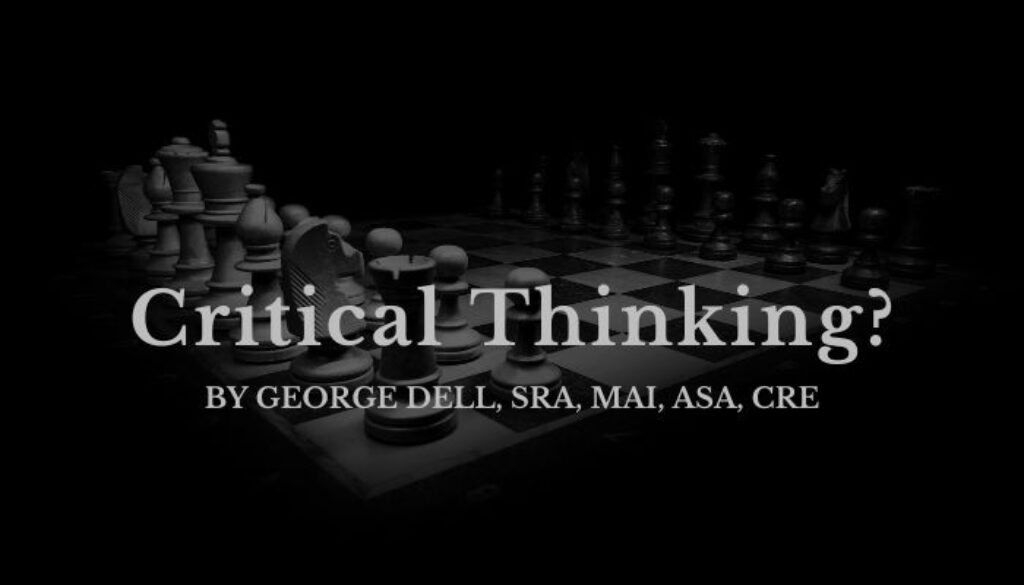Is thinking necessary? Are there different types of thinking?
Can I avoid thinking about this?
As the appraisal profession transitions to data analysis methods – we discover that judgment becomes more important – not less important.
In fact, it does require we think about thinking! Let’s go!
We can contrast a critical thought process with belief-based thinking. This may be tricky. The entire appraisal process, the standards, insist that our work be “credible.” USPAP carefully and concisely defines the word “credible” as “worthy of belief.” Support your beliefs – in a worthy manner!
The appraiser should do worthy work of belief. Current practices, standards, and even regulations seem to avoid the concept of logic and reasoning and reliability as a goal. Although legacy practice/education provide methods for sparse/poor/difficult paper-data realities of the past.
We need to consider if a better goal is better. Critical, logical, data-focused analytic results may be a better goal. If we research this data-focused methodology, we find that critical thinking, is important. In fact, if we consider the science of data, we find that the discipline of data science, specifically recognizes, and requires, the role of the human expert!
So how do we brain-connect hard data, and thinking? Mostly it is reasoning rule, and visualization.
Critical thinking is a part of the scientific method. Data science recognizes that the best results come from expert experience, as well as the ability to analyze data. It’s about reasoning.
Reasoning, in science, is of three types: abductive, deductive, and inductive.
Abductive reasoning is similar to scope of work. It comes first. It involves delineating the problem to be solved, as well as laying out a best (or likely) path of solution. This requires judgment. We tend to take this step for granted. However, the worst mistakes made in valuation often involve misguided scope.
This step is exploratory in nature, with the emphasis on “how can my hypothesis (guess) be wrong?!”
Deductive reasoning can be described: “if A, then B, for sure.” It is math. A good example is the yes/no decision of whether a sale is directly competitive to the subject property, given the parameters of inclusion, such as living area range, or number of bedrooms.
Inductive reasoning can be described “if A, then B probably – with some level of uncertainty. (Understanding and dealing with uncertainty is a key part of EBV (Evidence Based Valuation)©
Critical thinking is well defined by the Foundation for Critical Thinking. Points made include:
- It is self-guided and self-disciplined to quality reasoning.
- It requires one to live rationally, reasonably, and emphatically.
- A goal is to diminish the power of egocentric and sociocentric tendencies.
- It requires a keen awareness of the flawed nature of human thinking, if undisciplined.
- Mental tools are concepts for analysis, assessment, and a path toward improved thinking.
Appraisers turned Asset Analysts embrace competence beyond just ethics and opinion.

January 10, 2024 @ 6:27 am
Great post George. The path to Evidence Based Valuation is paved with crushed assumptions.
January 10, 2024 @ 7:54 am
Great post George.
The road to Evidence Based Valuation is paved with crushed assumptions.
January 10, 2024 @ 8:16 am
I was taught, always be prepared to go to court. Meaning the opposing side should be able to read your appraisal (or hear your testimony) and come to the same conclusion without any guesswork.
My biggest issue as a reviewer/client is I send back 40% of the appraisals I receive just so they meet the assignment conditions, and nearly all of the appraisals take some amount of faith to be believed. It is rare I can read an appraisal without follow-up questions. When discussing this issue with the appraiser contractor, their reply is that when the appraisal is too specific (meaning they showed their math) it gets taken apart in cross exam. Therefore, they don’t want to be too precise!
Keep up the fight George, you’re headed in the right direction.